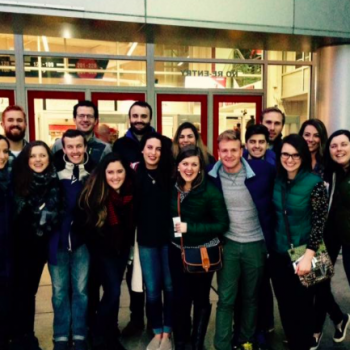When I graduated from high school, I was in a relationship that I thought had the next ten years laid out for me. So as my sophomore year of college rolled around, and I realized that wasn’t the solid promise I’d expected, I found myself feeling disoriented.
Who was I if not someone’s girlfriend? This question plagued me. To distract myself from my confusion, I began to take steps toward the type of work I knew God was calling me to. But I’m one of the lucky ones—growing up, I knew what I liked and I knew what I was good at. So while the steps weren’t concretely laid out, I did what I’d been taught my whole life to do and I dove headfirst into work.
I realize this isn’t necessarily everyone’s first inclination. Perhaps you don’t know what you like, or don’t know what you’re good at, or a deeper complication is keeping you from pursuing the goals that you might have had for yourself. If this is more relatable for you, there’s good news: the Lord’s call can be much easier to answer than we think.
I’m a Fr. Mike Schmitz super fan. Fr. Mike is the chaplain at the University of Minnesota-Duluth’s Newman Center. He also has a podcast and does a lot with a Catholic media company called Ascension Presents. In a homily last year, Fr. Mike laid out the three Senses of Vocation—the three “levels”, if you will, of the Lord’s call to each of us.
First, there’s the universal call—the call to holiness that everyone is meant for. It’s an unchanging call that we have throughout our lives and one that supersedes all others.
Second, there’s our primary relationship call. What primary relationship am I called to that will bring me closer to answering the universal call? This is the call that we most commonly refer to as our “vocation”. Am I called to be married? Am I called to religious life? Am I called to life as a consecrated person? Our primary relationship call answers these questions.
The third and final call is our call to work. What is the task or work that God is calling me to in the current moment? The term “moment” here is relative. It could mean the immediate moment, or it could simply mean this particular moment in life—at the age of 25, for example.
But there’s an important distinction to be made here. We must recognize that while we’re meant to answer the momentary call to work, our identity does not necessarily lie in this call. This is an easy mistake to make as single people in our twenties. We desire these certain “identities”, if you will, as husbands and wives, or fathers and mothers, so when those are out of reach, we’re tempted to stake our identities in the labels we find at work. When we’re faced with this temptation, we have to recognize that external circumstances do not account for our happiness.
A personal struggle I’ve had in answering my call to work is the feeling that my work bears no fruit. Working in politics, I’ve played many roles in the past few years alone that have seemed to bear no weight—and that’s been difficult for me. Who am I if my work means nothing? If I’m not a wife, or a mom, and the work I’m doing is translating to very little fruit, what’s the point? What am I striving for? What is the call that I’m answering?
In these moments, we’re called to remember that there is dignity in all work. We see this in the story of creation—that God is a God of work, and that His work is good.
Around the time in college that I was wrestling with these questions, I wrote down a story I read that’s so applicable to this struggle:
A man was sleeping when suddenly, his room filled with light and the Savior appeared. The Lord told the man he had work for him to do and showed him a large rock in front of his cabin. The Lord explained that the man was to push against the rock with all his might.
This the man did, day after day. For many years, he toiled from sun up to sun down, his shoulders set squarely against the cold, massive surface of the unmoving rock, pushing with all his might. Each night, the man returned to his cabin sore and worn out, feeling that his whole day had been spent in vain.
Seeing that the man was showing signs of discouragement, Satan entered the picture by placing thoughts in his mind: “You have been pushing against that rock for a long time, and it hasn’t budged. Why kill yourself over this? You are never going to move it.” Thus giving the man the impression that the task was impossible and that he was a failure, these thoughts discouraged and disheartened him. “Why kill myself over this?” he thought. “I’ll just put in my time, giving just the minimum effort, and that will be good enough.” And that he planned to do—until a day that he decided to take his troubled thoughts to the Lord.
“Lord,” he said, “I have labored long and hard in your service, putting in all my strength to do that which you have asked of me. Yet, after all this time, I have not even budged this rock. What is wrong? Why am I failing?”
To this, the Lord responded compassionately: “My friend, when I asked you to serve me and you accepted, I told you that your task was to push against the rock with all your strength. Never did I say that I expected you to move it. Your task was to push. And now you come to me, with your strength spent, thinking that you have failed. But is that really so? Look at yourself. Your arms are strong and muscled, your back sinewed and brown. Your hands are callused from constant pressure, and your legs have become massive and hard. Through opposition, you’ve grown much and your abilities now surpass that which you used to have. Yet you haven’t moved the rock. But your calling was to be obedient and to push, to exercise your faith and trust in My wisdom. This, you have done.
“I, my friend, will now move the rock.”
Fr. Mike expressed this same idea when he made this statement in his homily:
“If you can do all of these incredible ‘whats’ but you’re not an incredible ‘who’, then it’s all for absolutely nothing. The goal is excellence, but not mere excellence in ability. The idea is that by putting all of this work in, I don’t just make an excellent thing—I become an excellent someone. It’s not just the ‘what’ that I do—it’s the ‘who’ that I become.”
I am of the belief that we, as a society, do an incredible disservice to humanity by failing to encourage young, single people to actively prepare themselves for their primary relationship vocation. Regardless of whether a person is called to marriage or to religious life, we know that we cannot give to anyone else what we do not have ourselves. If I’ve wasted my years as a single person in my twenties indulging in my own worldly selfishness, and have failed to look introspectively at my life, what will I have to bring to my future vocation as a religious or as a spouse? Or, rather, what will I fail to bring to my future vocation?
Work is a very big part of this. It’s a tool for self-molding that the Lord’s given us, and our call is to use it—not so as to do these incredible “whats”, but to become an incredible “who”.












